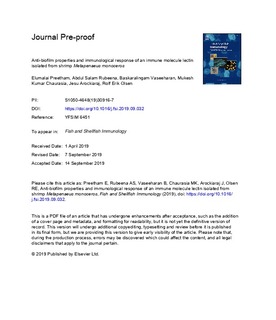Anti-biofilm properties and immunological response of an immune molecule lectin isolated from shrimp Metapenaeus monoceros
Preetham, Elumalai; Rubeena, Abdul Salam; Vaseeharan, Baskaralingam; Chaurasia, Mukesh Kumar; Arockiaraj, Jesu; Olsen, Rolf Erik
Journal article, Peer reviewed
Accepted version

Åpne
Permanent lenke
http://hdl.handle.net/11250/2636134Utgivelsesdato
2019Metadata
Vis full innførselSamlinger
- Institutt for biologi [2512]
- Publikasjoner fra CRIStin - NTNU [37186]
Sammendrag
The study is carried out to understand the antimicrobial and immunological response of a potential immune molecule lectin, MmLec isolated from haemolymph of Speckled shrimp, Metapenaeus monoceros. MmLec was purified using mannose coupled Sepharose CL-4B affinity chromatography, which was further subjected on SDS-PAGE to ascertain the distribution of their molecular weight. Sugar binding specificity assay was conducted at various pH and temperatures to investigate the binding affinity of MmLec towards the specific carbohydrate molecule. Functional analysis of immune molecule MmLec included haemagglutination assays performed using human erythrocytes and yeast agglutination activity against Saccharomyces cerevisiae which, were analyzed using light microscopy. In order to study the antimicrobial activity, two Gram-negative (Vibrio parahaemolyticus and Aeromonas hydrophila) and two Gram-positive (Staphylococcus aureus and Enterococcus faecalis) bacteria were treated with purified MmLec. Moreover, these bacterial species were also treated at different concentration of the MmLec to speculate the antibiofilm properties of MmLec which was analyzed under Light Microscopy and Confocal Laser Scanning Microscopy. In addition, other functional characterization of MmLec showed the uniqueness of MmLec in agglutination of human erythrocyte as well as the cells of yeast Saccharomyces cerevisiae. Also, the phenoloxidase activity and encapsulation assay was evaluated. MTT assay displayed that MmLec are potent in anticancer activity. The study will help to understand the immunological interference and antimicrobial nature of MmLec which would be supportive in establishing a potential therapeutic tool and to develop better and novel disease control strategies in shrimp and farmed aquaculture industries as well as in health management.
